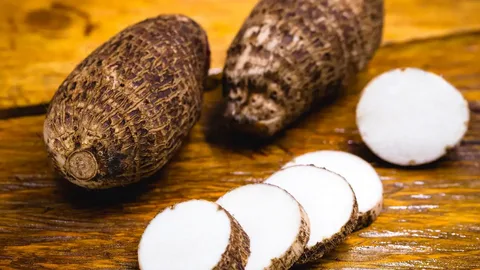By WebMD Editorial Contributors
Reviewed by Dan Brennan, MD on September 19, 2020
IN THIS ARTICLE
Nutritional Info
Serving Size 1 Each
Calories -112
% Daily Value*
Total Fat 0g 0%
Saturated Fat 0g 0%
Trans Fat 0g
Cholesterol 0mg 0%
Sodium 72 mg 3%
Potassium 0 mg 0%
Total Carbohydrate 26g 9%
Dietary Fiber 4g 16%
Sugar 5g
Protein 2g 4%
*Percent Daily Values are based on a 2,000 calorie diet.
Your daily values may be higher or lower depending on your calorie needs.
- Vitamin C 5%
- Iron 6%
- Vitamin B 60%
- Magnesium 0%
- Calcium 4%
- Vitamin D 0%
- Cobalamin 0%
- Vitamin A 369%
Yams (Dioscorea) are often mistaken for sweet potatoes, but they are not the same vegetable.
Although both grow underground as tubers, they come from differently different plants.
Yams have a rough, scaly exterior which is very different from the smooth skin of a sweet
potato, and are less sweet in flavor.
Yams have a long history of being used in traditional medicine in their native areas of Asia, Africa, and the Caribbean.
Health Benefits
May prevent and relieve arthritis symptoms
Wild yam root contains diosgenin, which has been shown to inhibit the progression of both osteoporosis arthritis and rheumatoid arthritis.
Mice who were given wild yam extract daily for 90 days showed a measurable decrease in inflammation and, at higher doses, pain levels. Human studies are still needed to determine whether these same effects would occur in humans.
May reduce cholesterol
When diosgenin extracted from wild yam root was given to mice for four weeks, it significantly reduced both their overall cholesterol levels and their LDL levels. Researchers say their results indicated that diosgenin could reduce body weight and decrease cholesterol levels. The results are promising, but human studies are needed.
May improve hormone balance
Scientists can use the diosgenin in yams to produce estrogen, progesterone, cortisone, and other hormones for medical use.
In alternative medicine, yam cream is often used in place of estrogen cream to relieve symptoms of menopause. Women are sometimes advised to eat yams to help balance their hormones, and people with hormone-related conditions are discouraged from using yams medicinally. However, studies seem to disprove this usage. The human body does not seem to be capable of converting diosgenin into hormones. More studies are needed, but it seems that using yams to treat menopause, PMS, infertility, and low libido is not effective.
Nutrition
Nutrients per Serving
Yam nutrition per 5-inch yam:
- Calories: 112
- Fat: 0 grams
- Cholesterol: 0 grams
- Sodium: 4 grams
- Carbohydrates: 26 grams
- Fiber: 4 grams
- Protein: 2 grams
A single yam packs a whopping 369% of your daily Vitamin A requirement. Yam vitamins and minerals also include vitamin C, calcium, and iron.
Things to Watch Out For
People with hormone-connected health issues like endometriosis and uterine fibroids and anyone using estradiol-based birth control or hormone therapy should avoid yam-based medicines or large quantities of yams.
How to Prepare Yams
Most of the research on the health benefits of yams has been on specific compounds extracted from the plant root. However, if you’d like to add more yams to your diet, they are easy to prepare.
When shopping, you may see sweet potatoes marketed as yams. To be sure you’re buying the right thing, look for a long, tapered shape and a skin that looks more like bark than potato skin.
True yams have a very neutral flavor and tough flesh. They are best when boiled and make a nice addition to soups and stews.
© 2020 WebMD, LLC. All rights reserved.
